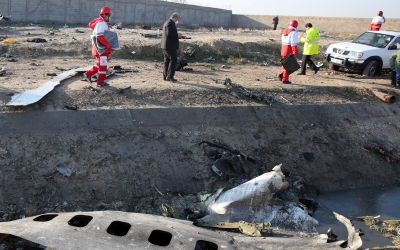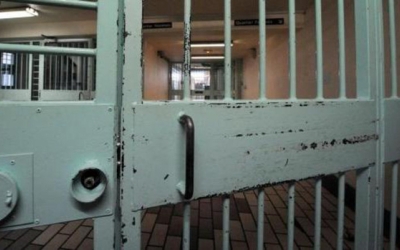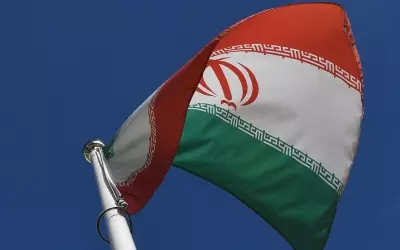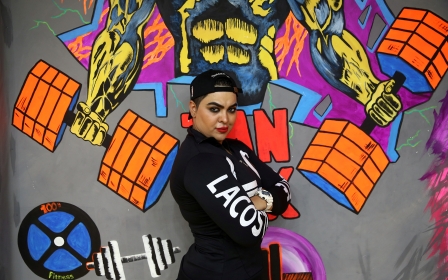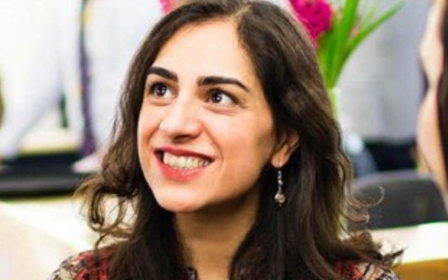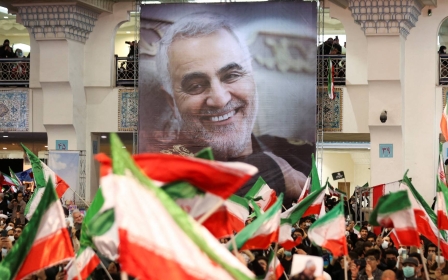Iranian press review: Anger and frustration boil over for families of Ukrainian plane victims
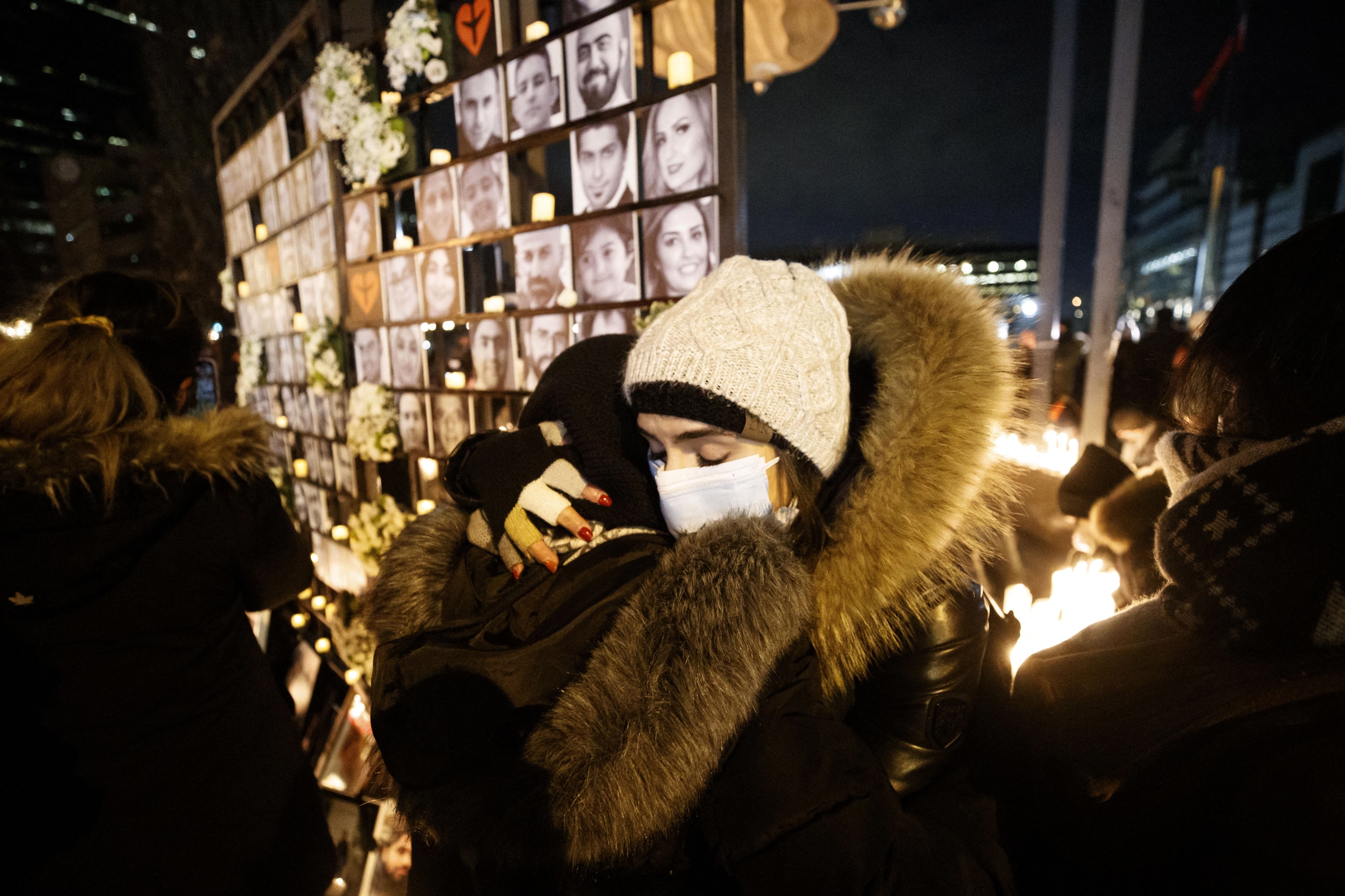
Downed plane victims' families demand justice
On the second anniversary of the downing of the Ukrainian International Airline flight PS752 by Iran's Islamic Revolutionary Guard Corps (IRGC) airforce, emotional videos of grieving family members of victims who live in Iran flooded Farsi social media.
The videos were published one day after the Iranian government announced that it had begun paying compensation to the families.
Many family members of the Iranians killed in the downing of the Ukrainian plane stressed that what they wanted was not compensation but justice and truth.
In one of the videos, a father of the victims who died in the attack insisted that he wanted the IRGC aerospace force commander General Amir Ali Hajizadeh to be tried.
New MEE newsletter: Jerusalem Dispatch
Sign up to get the latest insights and analysis on Israel-Palestine, alongside Turkey Unpacked and other MEE newsletters
To express the pain that his family has gone through, the father – speaking at the grave of his loved ones – said that "parents' death destroys the past, but when your child dies, it is the future that is destroyed".
In another video, captured at Tehran's Imam Khomeini international airport, the family members chanted "truth” and “justice".
"It's been two years that we've had nightmares every night," said one family member in the video.
"What is the truth? The truth should be unveiled. The truth should not be sacrificed for the interest of the politicians."
Meanwhile, Farsi-language dailies published interviews with the family members demanding justice, stressing that the government had not answered their questions about the incident.
Jamshid Rahmanifar, another victim's father, told the Shargh daily he had no hope that the Iranian judiciary system would bring to justice the perpetrators of the jet downing. He also criticised the way officials had treated the victims' families during the past two years
"I told one of the officials that I wished they would not say anything at all because any time they open their mouths, they add to our pains," he said, according to Shargh.
Outcry over jailed poet's death
The death of the 48-year-old writer and poet Baktash Abtin sparked anger and anguish among Iranians, who are shocked by the death of yet another prisoner.
On Saturday, Farsi news agencies reported Abtin's death at a hospital in Tehran after he contracted coronavirus in prison for the second time.
Since September 2020, Abtin, along with two other writers, Reza Khandan Mahabadi and Keyvan Bajan, was serving a six-year sentence at Tehran's infamous Evin prison on charges of "propaganda against the state" and "collusion against national security".
Abtin was on sick leave from the prison at the time of his death. His family and the Iranian Writers Association (IWA) underlined that the poet died because of prison pressures and the lack of needed medical treatment.
The IWA posted a letter on messaging app Telegram on Monday, which was signed by the political prisoners jailed in Evin who testified that Abtin's death occurred due to systemic pressure by prison authorities on political prisoners.
"Baktash, like all the other prisoners in the Islamic Republic, was sentenced to a slow death due to the prison's horrible hygiene conditions," the statement read, "and when the pandemic began, he got sentenced to death due to the coronavirus."
Meanwhile, on Farsi social media, Iranians posted videos of Abtin before his imprisonment, in which he talked about the necessity of uncompromised political activism in today’s Iran.
"What is lacking in today's Iran is a group of people to stand up and demand their rights," Abtin said in a recent video that went viral. "That's why I'd prefer to powerfully offer my life [for this goal] while I'm still young," he added.
Since the beginning of Abtin's imprisonment, several reports had been published about his deteriorating health condition.
In April 2020, Abtin was infected with the coronavirus in prison, but Iran's prison officials did not permit him to leave for treatment. In July 2020, he was transferred to a hospital following serious health problems.
After a photo showing him chained to the hospital bed went viral, he was returned to the prison without completing his treatment.
In mid-December, he was infected with Covid-19 for the second time. As his health rapidly deteriorated, the judicial system let his family transfer him to a hospital where he died three weeks later.
Saudi Arabia's role in Vienna talks
Iranian media outlets published conflicting analysis about meetings between a Saudi diplomat, the US special envoy for Iran, and French and Russian delegations present at Vienna talks.
Following meetings between Abdullah bin Khalid Al Saud - Saudi Arabia's ambassador to the United Nations in Vienna - with American, French and Russian diplomats, pro-reformist dailies warned the Iranian negotiating team about his presence and influence on other countries at the talks.
Since April 2021, Iran has been negotiating with Germany, France, the United Kingdom, Russia and China in Vienna to revive the 2015 nuclear deal. However, Iran has rejected US participation in the talks after former president Donald Trump officially withdrew from the agreement in 2018.
On Saturday, the pro-reformist Shargh daily criticised Iran's strategy of avoiding direct talks with the US. The daily suggested that this strategy opens the path for countries such as Saudi Arabi to demand concessions.
"Now Saudis, without giving any concessions to Iran, have found a chance to have an impact on the conditions set by the negotiators," wrote the daily.
Meanwhile, the IRGC-affiliated Javan daily hinted that the reason behind the Saudi ambassador's meetings with western diplomats was the high probability of an agreement between Iran and world powers.
The daily wrote that "the odour of an agreement had brought the Saudis to Vienna" to sabotage the negotiations.
*The Iranian press review is a digest of reports that are not independently verified as accurate by Middle East Eye.
Middle East Eye delivers independent and unrivalled coverage and analysis of the Middle East, North Africa and beyond. To learn more about republishing this content and the associated fees, please fill out this form. More about MEE can be found here.


